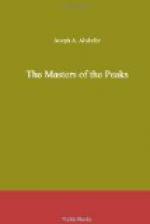He saw the great star on which Tayoga’s Tododaho lived, and he accepted so much of the Iroquois theology, believing that it was in spirit and essence the same as his own Christian belief, that he almost imagined he could see the great Onondaga chieftain who had gone away four centuries ago. In any event, it was a beneficent star, and he was glad that it shone down on him so brilliantly.
Tayoga before his departure had loaned him one of his blankets and now he lay upon it, with the other wrapped around him, his loaded pistol in his belt and his loaded rifle lying by his side. The fire that the Onondaga had built in the dip not far away had been put out carefully and the ashes had been scattered.
Although it was midsummer, the night, as often happened in that northern latitude, had come on cool, and the warmth of the blankets was not unwelcome. Robert knew that he was only a mote in all that vast wilderness, but the contiguity of the Indian village might cause warriors, either arriving or departing, to pass near him. So he was not surprised when he heard footsteps in the bushes not far away, and then the sound of voices. Instinctively he tried to press his body into the earth, and he also lifted carefully the loaded rifle, but second thought told him he was not likely to be seen.
Warriors presently came so near that they were visible, and to his surprise and alarm he saw the huge figure of Tandakora among them. They were about a dozen in number, walking in the most leisurely manner and once stopped very close to him to talk. Although he raised himself up a little and clutched the rifle more tightly he was still hopeful that they would not see him. The Ojibway chieftain was in full war paint, with a fine new American rifle, and also a small sword swinging from his belt. Both were undoubtedly trophies of Oswego, and it was certain that after carrying the sword for a while as a prize he would discard it. Indians never found much use for swords.
Robert always believed that Tayoga’s Tododaho protected him that night, because for a while all the chances were against him. As the warriors stood near talking a frightened deer started up in the thicket, and Tandakora himself brought it down with a lucky bullet, the unfortunate animal falling not thirty yards from the hidden youth. They removed the skin and cut it into portions where it lay, the whole task taking about a half hour, and all the time Robert, lying under the brush, saw them distinctly.
He was in mortal fear lest one of them wander into the dip where Tayoga had built the fire, and see traces of the ashes, but they did not do so. Twice warriors walked in that direction and his heart was in his mouth, but in neither case did the errand take them so far. Tandakora was not alone in bearing Oswego spoils. Nearly all of them had something, a rifle, a pistol or a sword, and two wore officers’ laced coats over their painted bodies. The sight filled Robert with rage. Were his people to go on this way indefinitely, sacrificing men and posts in unrelated efforts? Would they allow the French, with inferior numbers, to beat them continuously? He had seen Montcalm and talked with him, and he feared everything from that daring and tenacious leader.




